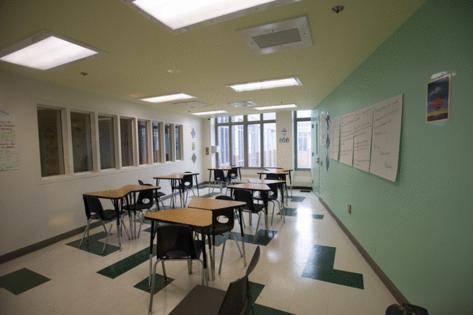New report questions quality of education for NYC kids facing juvenile detention
Published in News & Features
NEW YORK — For the first time, newly available data confirmed Monday what many have long suspected: New York City is failing to intervene before students become involved with the court system, and not doing enough to help them get back on track once in the city’s care.
Some 1,040 young people were enrolled in Passages Academy, the educational program for students charged or found responsible for a crime, at some point during the last school year, according to the report from Advocates for Children. They include youth in the city’s two secure detention centers for juveniles, Crossroads Juvenile Center in Brooklyn and Horizon Juvenile Center in the Bronx, as well as nonsecure facilities and residential placements.
“The snapshot we’re getting of the students enrolled in Passages is that it’s likely that they had unmet needs then that led them to the detention or placement that they are in,” said Rohini Singh, director of the School Justice Project at Advocates for Children.
Researchers found almost all young people cycling in and out of Passages were boys. The students were more likely to have emotional and learning disabilities, disproportionately Black and in foster care. At least half struggled with illiteracy, performing worse on reading screeners than 95% of students in their grade.
Advocates for Children was part of a coalition that pushed for legislation, passed in late 2023, that required the city Department of Education and the Administration for Children’s Services to publish data on their educational offerings for justice-involved youth.
Monday’s report was based on the new availability of that data, and its release timed to coincide with a City Council oversight hearing in the afternoon on the quality of education in juvenile detention. It featured their clients’ stories about a lack of services or plans for after their children’s release.
Among the testimonials was a 19-year-old Crossroads detainee who required regular counseling due to a disability. He received only three sessions during his year in detention.
Another student, 14, was discharged from Horizon under conditions of house arrest and a two-day window to enroll in school. His mom went to their local school to register her son, but the school turned her away because he was not present due to the conditions of his release.
“When a student’s in detention or placement, obviously it means that something has happened in their lives and it’s a point of crisis — but also a point of intervention,” Singh added.
Over the last couple of years, attorneys have sounded the alarm about juvenile detainees sleeping on the floor of classrooms because of overcrowding, rendering the spaces unusable for educational purposes. They say students have been given paper packets without supervision in lieu of quality in-person instruction.
“We consistently hear from the young people we serve that they are not taken to school, that entire units are kept from attending because one or two young people refuse, and that instead of instruction they are handed packets no one explains or reviews,” said Melinda Andra, lead attorney of the education division at the Legal Aid Society, which represents about 90% of court-involved youth.
And while young people classified as having emotional disabilities are overrepresented at Passages, there are only two psychologists assigned to the various school sites, and one in six special education students in the program did not receive a plan for services in a timely way, according to Monday’s report.
Still, advocates have limited understanding of the academic progress that Passages students are making, in part because the city did not share data on a number of measures required by the law. Spokespeople did not explain the omission.
“We take these concerns extremely seriously,” said Onika Richards, a spokeswoman for the public schools. “This work is ongoing, and we will continue to prioritize strengthening any necessary interventions and removing any barriers that have disrupted student learning in the past.”
The rep for the Administration for Children’s Services said the agency has added staff in recent years who coordinate with the public schools, partnered with CUNY, and helped coordinate tutoring. Last school year, 15 students graduated high school and 28 earned their GEDs, up from eight and 30 the year before, respectively. So far this fall, a half-dozen young people have passed the GED test, while dozens more enrolled in college courses.
“We are seeing progress, with more young people graduating from high school, getting their GEDs, and starting college,” said Marisa Kaufman, an Administration for Children’s Services spokeswoman.
But Singh, the director at Advocates for Children, said the city needs to do more to ensure young people, once released, reconnect with school and break the cycle of returning to Passages.
Among those who did continue their education, another quarter left school less than 10 days after their release; many more missed more days of school than they attended.
“They’re discharged and then, unless there are the supports in place to help them attend school regularly,” Singh said, “what happens is they often will just end up back right in detention.”
_____
©2025 New York Daily News. Visit nydailynews.com. Distributed by Tribune Content Agency, LLC.







Comments